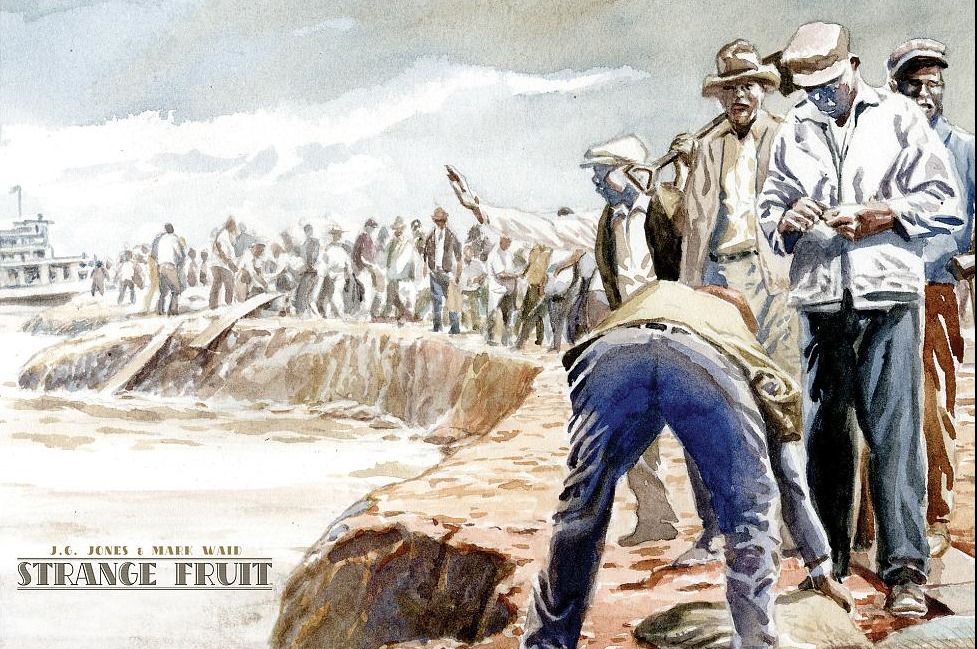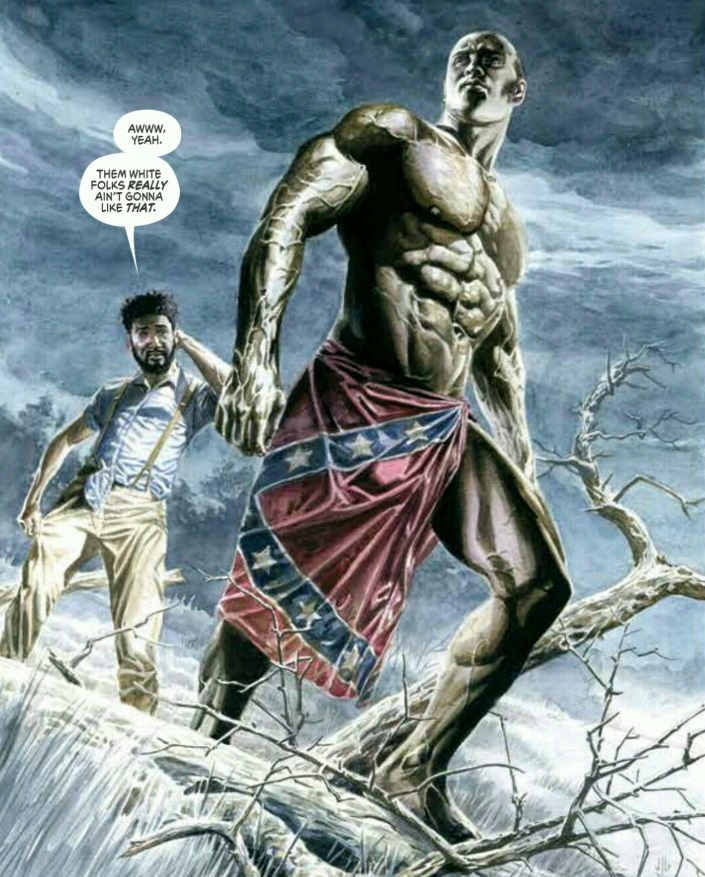The final image of Strange Fruit #1 is a strapping black man standing stoically with a Confederate flag draped around his waist, while another, less conventionally sexualized black man says “Aww yeah. Them white folks REALLY ain’t gonna like that.” The larger man with the flag for a kilt looks like something from one of those DeviantArt accounts dedicated to Nubian iconography filtered through every Mandingo fantasy ever conceived. It wouldn’t look out of place at Rachel Dolezal’s house. Perhaps if this was a scene in a Quentin Tarantino movie and that line of dialogue was delivered with scenery chewing brio by Samuel L. Jackson while Marvin Gaye’s “Trouble Man” played anachronistically in the background, this image might possess a certain pulp charm. It’d also make for a very comical short film from Kanye West. Unfortunately, it’s the parting shot from a serialized piece of graphic fiction, and comic books, moreso than film or music, rely on a particular engagement from their readership to fill in the blanks of evocatively sequenced images. Given a rich understanding of the art form, you wonder why two men as talented as Mark Waid and JG Jones might not have crafted the opening salvo of their guaranteed-to-be-controversial series with a little more care.
Before we get into the real meat of Strange Fruit, we should have a little “full disclosure time.” I love Mark Waid. I stan for him pretty hard and have since I was old enough to buy my own issues of Wizard Magazine. In my eyes, he’s up there with Grant Morrison as one of comicdom’s unimpeachable talents. If I have a weakness as a critic and consumer of popular culture, it’s that I maintain a soft spot for my heroes at times it might behoove me to be more objective. I still watch Woody Allen movies, for example. It eats at me in casual conversation with peers, to be honest, as I always feel like the youngest sibling who sided with the wrong parent after a divorce. I know when my faves are being problematic, but I typically mark the date and time I discover some new fuckery about a creator I admire with a solemn shaking of the head, and an impassioned “really, dude?” Then, you know, keep it the fuck moving, because I like what I like and I’m probably less progressive than I let others give me credit for.
Strange Fruit has been inciting think pieces left and right since it was announced. Maybe because two old white dudes wanted to tell a story about black struggle in the South? Maybe because they fucking named it STRANGE FRUIT like that was a normal fucking decision or something?! Regardless, I remember the day news of this title dropped. My initial reaction was “huh” coupled with a certain curiosity. Reminder, I generally check out the first issue of everything Mark Millar does and I actively despise his work. I like unpacking stuff. I like digging into a piece of art and trying to figure out what it wants, what it’s going for, why it exists. I feel this way about Paul Blart: Mall Cop as much as I did about Maus. Waid has written countless cape comics that mean a great deal to me, as a reader and as a human being, so I was more than willing to give him the benefit of the doubt on this one, especially since it just sounded like an Elseworlds Superman comic that DC didn’t want.
The gist of Strange Fruit takes place in 1927 Mississippi, a setting so stereotypically rife with racial tensions as to border on parody. There’s some mean white folks who say “nigger” liberally, some kind white folks who don’t seem to agree with that breed of hatred, and some indiscriminate black folks just trying to get by. No characters stand out. There are no unique identities. If my description of what passes for the first issue’s plot seems like an amorphous blob of pronouns, it’s because that what this issue provides. There’s some business about floods and levees and a black man wearing a suit being ignored about basic science that lazily echoes Hurricane Katrina, but the big moment that sets up the story proper is the arrival of the nameless, voiceless black man who falls from space. He roughs up some Klansman but good and gets to suggestively pose at the issue’s conclusion.
Now, I was nowhere near as offended by this issue as many seem to be. I loved J.A. Micheline’s piece over at Women Write About Comics, but for me, the biggest issue wasn’t that two old white dudes decided to tell a story principally concerned with blackness as much as the laziness with which they executed said story. Passing off something as fanfiction-y as “black Superman lands in racist South” as a passion project feels even more off kilter when you recall J.G. Jones refering to the book as “an edgy little piece.” Being a fan of both creators, I longed for there to be SOMETHING, ANYTHING to grab a hold of. Jones’ art feels flat and uninspired, like a bland approximation of Alex Ross’ painting style mixed with the untapped potential of subverting the obvious Rockwell influence. His compositions reek of a stagnancy that makes the issue’s lone bit of action seem more perfunctory than revelatory. The whole fucking thing just sits there, and it’s that haphazard sense of “eh” that makes that final image so frustrating.
Personally, I’m not as bothered by white creators telling stories about people of color as I am people of color not getting the opportunity to tell these stories themselves. Maybe there’s some burning white guilt from growing up in the South that Waid and Jones felt the need to exorcise, but here, they’ve managed to craft little more than the opening chapter of a comic that reads like Oscar-bait bullshit. There’s a well white writers are allowed to refill from whenever they want instant gravitas, and it usually involves the suffering of brown people as easy spectacle. They get to use a shorthand for dramatic heft and readily available conflict that doesn’t require any real sacrifice. They get to take a generic science fiction premise and gussy it up as “an edgy little piece.” As with most things in popular culture, black lives are a useful Instagram filter you can place over an idea to give it some credibility.
I don’t believe there’s anything pernicious about this comic, either, but that’s the point. In culture, we love to demonize the easiest villains. That’s why we’ve been fighting a war on a fucking flag for several weeks as though folding up any lasting relics of the Confederacy like goddamn Horcruxes will just eradicate the sinister specter of racism. It’s a hell of a lot easier to do than take a long hard look at the simple, unintentional things we do to further systemic oppression. I don’t dislike or disrespect Mark Waid for making this book at all, nor do I think he did it with ill intent, Unfortunately, good intentions rarely matter. There’s an opportunity here to do something really special with this piece of history, but for now, it just feels like big name creators jerking off for a prestige project. Waid and Jones teaming up was the sell, and if this book had been about toaster ovens that fight zombie kangaroos, I imagine they’d have been equally enthusiastic, which makes them patting themselves on the back for telling a “difficult story” that much more aggravating. It’s just hard for me to believe BOOM! Studios would have been so eager to publish this project if it had been from the mind of a David Walker and ChrisCross.
This being only a first issue, I would love to see Strange Fruit evolve into something more powerful and more beautiful than what it currently seems to be, but my itching suspicion is that someone as good at writing first issues as Mark Waid would have delivered better here if there was more to show down the road. Me? I’ll keep reading, because we’ve established I’m a weirdo glutton for punishment, but outside of oddball curiosity, I can’t give you a good reason to do the same yourself.
Strange Fruit #1 is available now online or at your local comics shop.




